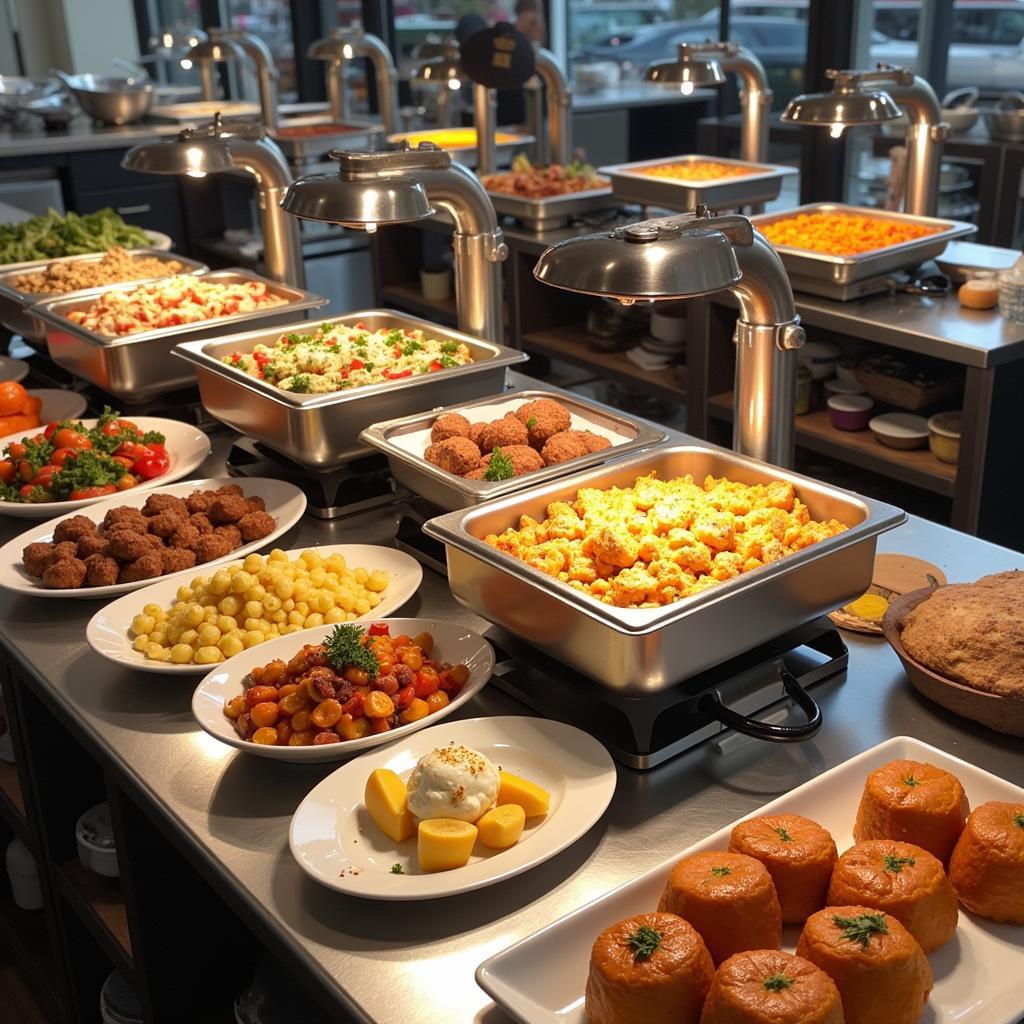In the fast-paced world of food service, maintaining optimal food temperatures is non-negotiable. Whether you’re running a bustling cafeteria, a cozy cafe, or a high-end buffet, commercial electric food warmers have become an indispensable tool for ensuring food safety, quality, and customer satisfaction. But with a dizzying array of options available, choosing the right countertop food warmer for your specific needs can feel overwhelming.
This comprehensive guide dives deep into the world of Countertop Food Warmers Commercial, arming you with the knowledge to make an informed decision for your business.
Why Countertop Food Warmers are Essential for Your Business
Imagine this: a customer eagerly awaits their meal, only to be served lukewarm disappointment. Not only does this compromise their dining experience, but it also raises red flags about your food safety standards. Countertop food warmers eliminate this risk by keeping your culinary creations at the ideal serving temperature, ensuring:
- Food Safety: Maintaining food above the danger zone (40°F – 140°F) prevents bacterial growth and foodborne illnesses.
- Enhanced Food Quality: Heat lamps and controlled heating elements preserve the texture, flavor, and moisture of your dishes, keeping them fresh and appealing for longer.
- Improved Efficiency: Prepped food stays hot and ready to serve, streamlining your service and reducing customer wait times.
- Versatility at its Finest: From appetizers to entrees, side dishes to sauces, countertop food warmers accommodate a wide range of food items.
 Countertop Food Warmer Variety
Countertop Food Warmer Variety
Choosing the Right Countertop Food Warmer: Key Factors to Consider
Navigating the world of countertop food warmers commercial requires understanding your specific needs. Before you make a purchase, consider these critical factors:
1. Types of Food:
- Dry Heat: Ideal for breads, pastries, fried foods, and items that require crisping or toasting.
- Moist Heat: Perfect for delicate items like eggs, steamed vegetables, and sauces, as it prevents drying and maintains moisture.
- Combination Heating: Offers the flexibility of both dry and moist heat, making it suitable for diverse menus.
2. Capacity and Size:
- Assess your typical volume of food and choose a warmer with adequate capacity to avoid overcrowding and ensure even heating.
- Countertop space is precious; measure your available area to determine the appropriate warmer size.
3. Temperature Control:
- Precise temperature control is crucial for maintaining food quality and safety. Look for warmers with adjustable thermostats and clear temperature displays.
4. Features and Functionality:
- Consider features like timers, humidity control (for moist heat warmers), and built-in sneeze guards for added convenience and hygiene.
Exploring Different Types of Countertop Food Warmers Commercial
1. Soup Warmers:
- Designed specifically for holding soups, stews, and chili at consistent temperatures.
- Often feature round, stainless steel wells with adjustable temperature settings.
2. Buffet Warmers:
- Ideal for buffets, catering events, and self-serve stations.
- Available in various sizes and configurations to accommodate different dishes.
- Some models offer multiple compartments for serving a variety of items.
3. Heat Lamps:
- Use infrared bulbs to radiate heat downwards, keeping food warm without overcooking.
- Best for short-term holding of items like cooked meats, fried foods, and baked goods.
4. Strip Heaters:
- Compact and portable, perfect for warming plates or small quantities of food.
5. Induction Warmers:
- Use electromagnetic induction to heat food directly, providing fast and efficient warming.
- Require induction-compatible cookware.
Top Brands to Consider: Investing in Quality and Reliability
1. Crescor Food Warmers: Known for their durability, reliability, and precision temperature control. Crescor offers a wide range of countertop warmers to meet diverse needs.
2. Carter Hoffmann Food Warmers: Renowned for their innovative designs and focus on energy efficiency, Carter Hoffmann warmers are a popular choice for businesses seeking cutting-edge technology.
“When choosing a countertop food warmer, don’t compromise on quality. Invest in a reputable brand known for durability, reliability, and excellent customer support,” advises Chef Daniel Martel, a seasoned culinary professional with over 20 years of experience in the foodservice industry.
Maintaining Your Countertop Food Warmer: Tips for Optimal Performance
- Regular Cleaning: Clean your warmer thoroughly after each use to prevent food debris buildup and ensure proper hygiene.
- Calibration: Calibrate your warmer’s thermostat regularly to ensure accurate temperature readings.
- Preventative Maintenance: Schedule routine inspections by a qualified technician to identify and address any potential issues before they become major problems.
Conclusion: Elevate Your Food Service with the Perfect Countertop Food Warmer
Food warmer restaurants are essential for maintaining food safety, enhancing food quality, and streamlining your operations. By carefully considering your specific needs and investing in a high-quality warmer from a reputable brand, you’ll be well-equipped to keep your food hot, your customers happy, and your business thriving.
FAQs About Countertop Food Warmers Commercial
1. What is the ideal temperature range for holding hot food?
The safe holding temperature for hot food is above 140°F (60°C) to prevent bacterial growth.
2. Can I use a countertop food warmer for both hot and cold holding?
While some warmers offer a wider temperature range, it’s best to use separate appliances for hot and cold holding to ensure optimal food safety.
3. How do I calibrate the thermostat on my countertop food warmer?
Consult your warmer’s user manual for specific calibration instructions, as procedures may vary depending on the model.
4. What types of food are not suitable for countertop food warmers?
Avoid using countertop food warmers for raw meat, poultry, or seafood. These items require higher cooking temperatures to ensure safety.
5. What is the average lifespan of a commercial countertop food warmer?
With proper care and maintenance, a high-quality countertop food warmer can last for several years.
Do you have other questions? Contact us, Mina Cones Food, for any support you need. Our hotline: 02437655121, Email: [email protected] or visit our store at 3PGH+8R9, ĐT70A, thôn Trung, Bắc Từ Liêm, Hà Nội, Việt Nam. We are available 24/7 to assist you.